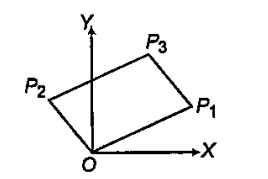Let OP.OQ=1 and let O,P and Q be three collinear points. If O and Q represent the complex numbers of origin and z respectively, then P represents
1z
¯z
1¯z
−z
The correct Answer is:C
Let P represent the complex number z1
Let z=reiθ. Then, OQ=r and arg(z)=θ
Since, O,P and Q are collinear points. Therefore,
arg(z1)=θ or π+θ
⇒z1=OPeiθ or, z1=Opei(π+θ)
⇒z1=OP.OQOQeiθ or, z1=(1OQe−iθ or z1=−1OQe−iθ
⇒z1=1reiθ or z1=−1reiθ
⇒z=1¯z or z1=−1¯z
Topper's Solved these Questions
- COMPLEX NUMBERS BOOK - OBJECTIVE RD SHARMACHAPTER - COMPLEX NUMBERS EXERCISE - Section II - Assertion Reason Type
15 Videos
- COMPLEX NUMBERS BOOK - OBJECTIVE RD SHARMACHAPTER - COMPLEX NUMBERS EXERCISE - Exercise
131 Videos
- COMPLEX NUMBERS BOOK - OBJECTIVE RD SHARMACHAPTER - COMPLEX NUMBERS EXERCISE - Chapter Test
59 Videos
- CIRCLESBOOK - OBJECTIVE RD SHARMACHAPTER - CIRCLESEXERCISE - Chapter Test
55 Videos
- CONTINUITY AND DIFFERENTIABILITYBOOK - OBJECTIVE RD SHARMACHAPTER - CONTINUITY AND DIFFERENTIABILITYEXERCISE - Exercise
86 Videos
Similar Questions
Knowledge Check
Let O, A, B be three collinear points such that OA.OB=1. If O and B represent the complex numbers O and z, then A represents
A1¯zB1zC¯zDz2In a given parallelogram, if the points P1 and P2 represent two complex numbers z1 and z2, then the point P3 represents the number
 Az1+z2Bz1−z2Cz1×z2Dz1+z2
Az1+z2Bz1−z2Cz1×z2Dz1+z2POQ is a straight line through the origin O,P and Q represent the complex numbers a+ib and c+id respectively and OP=OQ. Then, which one of the following is true?
A|a+ib|=∣c+Ba+b=c+dCarg(a+ib)=arg(c+id)Dnone of these
Let ABC be a triangle with circumcenre O. The points P and Q are interior points of the sides Let K, L and M be the mid points of the segments BP, CQ and PQ respectively, and let τ be the circle passing through K, L and M. Suppose that the line PQ is tangent to the circle τ. Prove that OP=OQ.
View SolutionLet A,B,C be three collinear points which are such that AB.AC=1 and the points are represented in the Argand plane by the complex numbers, 0, z1 and z2 respectively. Then,
View SolutionLet P and Q be two points on the circle |w|=r represented by w1 and w2 respectively, then the complex number representing the point of intersection of the tangents of P and Q is :
View SolutionLet P and Q be two points on the circle |w|=r represented by w1 and w2 respectively, then the complex number representing the point of intersection of the tangents of P and Q is :
View SolutionPoint P represent the complex number z=x+iy and point Q represents the complex number z+1z. If P moves on the circle |z|=2, then the eccentricity of locus of point Q is
View Solution
